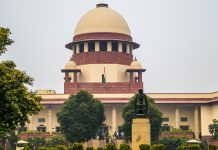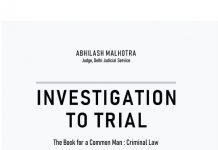The basic rule of evidence is primary evidence i.e. the original documents or record needs to be produced before the court. In the case of electronic evidence, it is always not practically possible to produce the primary evidence before the court. The primary data is stored in the hard disk or servers in some other electronic and it is not possible to stop the running operation and produce the hardware in the Court. To deal with this exigency the law made a mechanism in the form of Section 65B Indian Evidence Act, 1872 for making the secondary evidence i.e. the printout or other output from electronic data as admissible in the court. The certificate under section 65B Indian Evidence Act, 1872 is filed in support of secondary evidence i.e. the output generated from the computer/electronic device ex. Print outs. However, in cases where the primary evidence or the original device is produced in evidence the compliance of Sec. 65B is not be required.
For instance, investigating officer obtains the IMEI surveillance report from the mobile service provider. It is a computer-generated record and secondary evidence. The primary evidence is the data in an original form stored in the server of Telecom/Mobile service provider. Can we produce the server before the Court? No, it is practically not feasible. Therefore, we produce the electronic output which is secondary in nature and therefore compliance under Sec. 65B Indian Evidence Act, 1872 becomes cardinal and indispensable. On the other hand, if a conversation is recorded in a phone and the device in which the original conversation was recorded is filed in the court the certificate u/s 65B Indian Evidence Act,1872 is not required.
The certificate under Sec. 65B caters to following aspects in relation to the electronic output:
a. Identifies the electronic record and the accuracy of its contents.
b. The electronic record is reproduced or is derived from information fed into the computer in the ordinary course of the activities.
c. The manner of production of electronic record.
d. Particulars of the device involved in the production of that record;
e. The device was operating properly.
The compliance aims to ensure the integrity of the data and good working condition of hardware.
The certificate must be signed by a person occupying a responsible official position in relation to the operation of the relevant device in the ordinary course of activities.
A thing which needs to be kept in mind about the compliance of Sec. 65B Indian Evidence Act, 1872 is that it is necessary for relevancy and admissibility of electronic evidence. The genuineness, veracity, or reliability of the evidence is seen by the Court only after the stage of relevancy and admissibility. Only if the electronic record is duly produced in terms of Sec. 65-B of the Evidence Act, would the question of genuineness thereof would arise and, in that situation, the resort can be made to Sec. 45-A Indian Evidence Act, 1872 enabling the Court to consider the opinion of Examiner of Electronic Evidence. [Anvar P.V. vs. P.K. Basheer, 2014 10 SCC 473]
For instance, an email printout was filed before the Court along with certificate under Sec. 65B. Compliance of Sec. 65B is a prerequisite to tender that document at the stage of admissibility. The authenticity of email is still to be tested. The parties may lead evidence to prove whether the email is genuine or fake. As per section 45A of the Indian Evidence Act, 1872 the Court may also seek expert opinion to test the veracity of the document.
How can a person, who relies upon an electronic record, but not in control of electronic/computer system, furnish certificate under Sec. 65B Indian Evidence Act, 1872? What about the party, who is not in possession of a device from which the document is produced?
Such a party cannot be required to produce a certificate under Sec. 65B (4) of the Evidence Act, 1872. The applicability of requirement of certificate being procedural can be relaxed by the Court, wherever interest of justice so justifies. [Shafhi Mohammad vs. State of H.P.,2018 (2) SCC 801] For example, an accused wants to prove his boarding pass issued by an Airline in support of his plea of alibi. A boarding pass is an electronic computer-generated record. The passenger/accused is not in control of the computer system which generated the boarding pass. In such a scenario, the accused cannot be compelled to produce what is not in his possession. The Court may summon authorized person from the concerned airline and seek proof in this regard.















